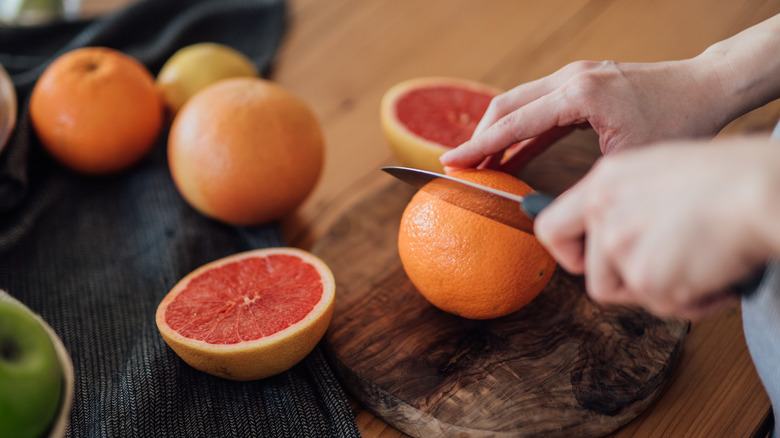Many Of The Most Nutrient-Dense Fruits Are Probably Already In Your Fridge
When you're looking for some of the best ways to get nutrients into your body, you don't need to load up on supplements or green powders. Some of the most nutrient-packed foods are the whole foods hanging out on the outer edges of your grocery store. That's where you'll find plenty of fresh meats and seafood, dairy, and produce, which are unprocessed and great for you.
If you're on a low-carb diet, you might have cut out fruit altogether, but citrus fruits deserve a second chance. Citrus fruits are some of the most nutrient-dense foods you can eat, and you don't need to shop at a fancy grocery store to find them. Even convenience stores usually carry a few citrus fruit options when you're on the go.
Gram for gram, an orange has fewer calories and less sugar than trendier fruits like jackfruit or dragonfruit. Your orange also has more vitamin C, folate, and fiber. Sure, some of those may offer more potassium or magnesium, but citrus fruits are loaded with natural metabolites and other compounds that can give your health a serious boost.
The healthy compounds in citrus fruits
Your basic nutrition label doesn't list many of the important compounds in citrus fruits that can have a big impact on your health. A 2015 review in the Chemistry Central Journal took a closer look at these specific compounds and how they affect your body. One major group you'll find in many fruits and vegetables is flavonoids. Oranges are rich in hesperidin, and grapefruits are a good source of naringin, but citrus fruits also pack in other flavonoids like naringenin, quercetin, and apigenin.
Flavonoids are plant compounds with antioxidant properties that help protect your cells from damage caused by free radicals. They also reduce inflammation and may slow the growth of certain cancer cells. The flavonoids in citrus fruits can also boost your heart health by lowering cholesterol and triglyceride levels, reducing blood pressure, and improving how your blood vessels function. They may even help regulate blood sugar by slowing down starch digestion and improving insulin sensitivity. On top of that, flavonoids protect brain cells and can improve memory and mood.
Citrus fruits are also great sources of carotenoids like lutein, zeaxanthin, and beta-carotene. You've probably heard these are good for your eyes, but they also help protect your skin from sun damage. And then there are phenolic acids, another group of antioxidants in citrus that support both brain and liver health.
Unique ways to include more citrus fruits in your diet
Drinking orange juice for breakfast does offer beneficial compounds, but it lacks the fiber that helps slow down blood sugar spikes. So if you've already got some OJ in the fridge, why not use it in a fresh, fiber-rich salad dressing? Mix some orange juice with a little olive oil, salt, and pepper. The Mayo Clinic suggests using this kind of orange juice dressing in a quinoa salad with mandarin slices, almonds, and green onions for extra flavor. Or, try combining orange juice with olive oil and balsamic vinegar for a zesty citrus salad dressing. Just top your favorite greens with peeled oranges and grapefruit.
You might also be surprised to learn that many of the healthiest compounds in citrus are actually in the peel. It's usually the part we toss in the trash or compost, but a 2025 study in Human Nutrition & Metabolism found that orange peels can help feed the good bacteria in your gut and turn polyphenols into even healthier compounds. While orange peel can taste bitter on its own, you can try candying it instead. Simmer the peels in boiling water for about 25 minutes, then transfer them to a separate pot of boiling sugar water and simmer for another 15 minutes. Let them dry overnight, then store them in an airtight container (per Zero Waste Chef).


